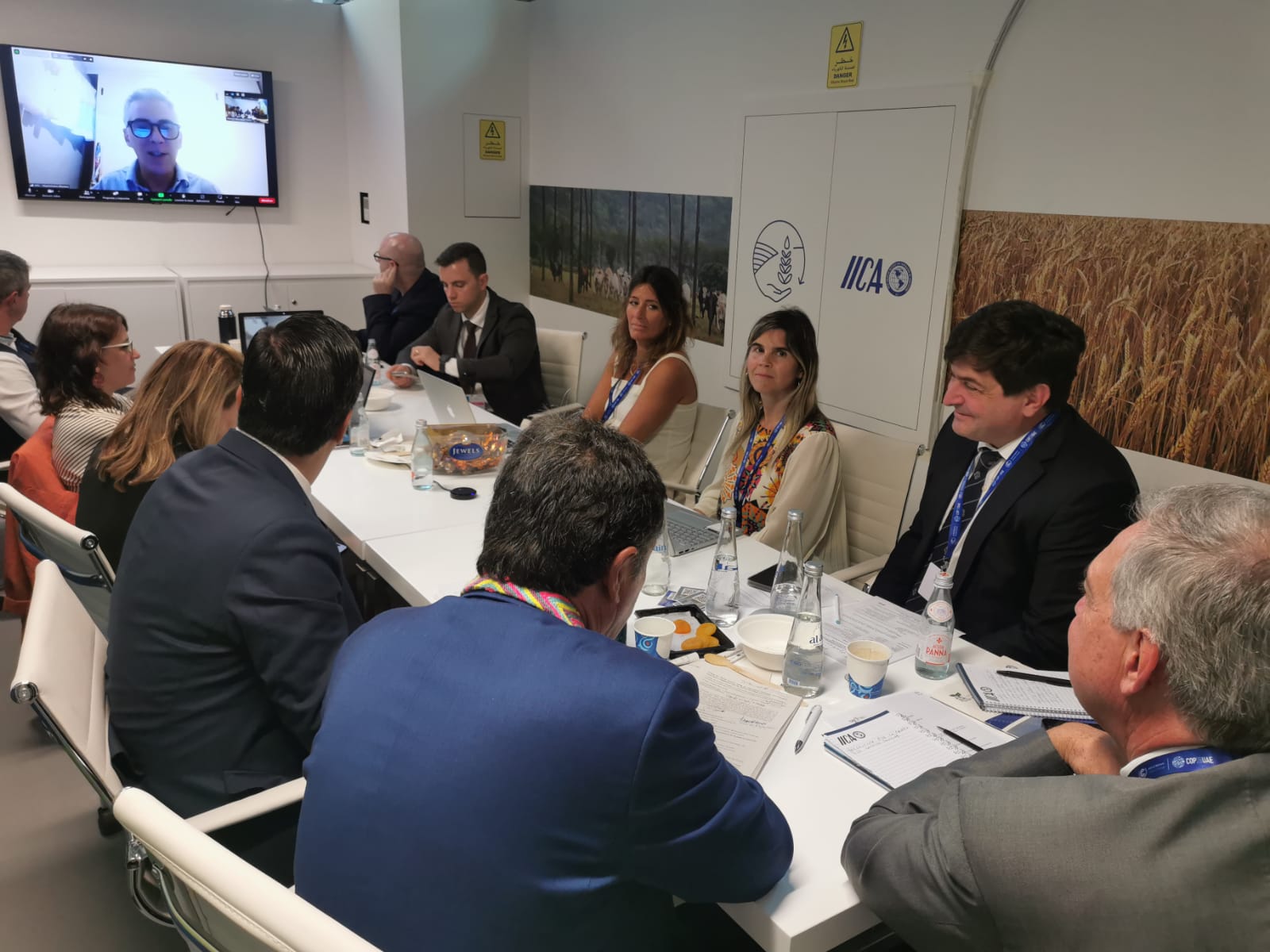In many areas of South America, flooding can be taking place in one region at the same time that droughts are affecting another. Some production ecosystems could of course benefit from an adequate water supply following long periods of scanty rainfall.

Dubai, United Arab Emirates, 12 December 2023 (IICA) – It is extremely likely that South America is facing a summer in which extreme climate events will impact production activity in these countries, due to the persistent effects of the phenomenon known as El Niño.
This was revealed in a scientific report presented at the United Nations Climate Change Conference (COP28) to ministers and senior agricultural officials of Argentina, Bolivia, Brazil, Chile, Uruguay and Paraguay – the member nations of the Southern Agricultural Council (CAS).
In many areas of South America, flooding can be taking place in one region at the same time that droughts are affecting another. Some production ecosystems could of course benefit from an adequate water supply following long periods of scanty rainfall. The report demonstrates that the impact of climate change has become a high priority issue for the region’s production sector.
CAS, the ministerial consultation and integration forum whose secretariat is overseen by the Inter-American Institute for Cooperation on Agriculture (IICA), held its final meeting of the year at the world’s major climate negotiation forum in Dubai, in a bid to reinforce the role of South American countries as guarantors of the world’s food security and environmental sustainability.
The scientific document that was presented forecasts heavier rainfall than normal, overflowing rivers that could trigger flooding and extremely powerful storms in the La Plata Basin, which includes Argentina, Uruguay, Paraguay and Southern Brazil.
On the other extreme, intense and severe droughts are expected in Northern and Northeastern Brazil. In a large part of Chile, higher than normal temperatures are predicted.
The information confirms the fact that the agriculture sector is the victim of climate change and must intensify collective efforts to remain resilient. The report was presented by Cecilia Gianoni, Executive Secretary of the Cooperative Program for the Development of Agrifood and Agroindustrial Technology in the Southern Cone (PROCISUR), an integration mechanism among research institutions in Argentina, Brazil, Chile, Paraguay and Uruguay, as well as IICA.
The CAS meeting was chaired by the Minister of Livestock, Agriculture and Fisheries of Uruguay, Fernando Mattos. Others in attendance were the Minister of Agriculture of Chile, Esteban Valenzuela; the Secretary of Trade and International Relations in the Ministry of Agriculture and Livestock of Brazil, Roberto Perosa; the Director of Planning in the Ministry of Rural Development and Lands of Bolivia, Blas Mamani; the Director of Multilateral Negotiations in the Secretariat of Agriculture, Livestock and Fisheries of Argentina, Maximiliano Moreno; and the Director General of Planning in the Ministry of Agriculture and Livestock of Paraguay, Leticia Torres.
Gabriel Delgado, who is the IICA Representative in Brazil, the Institute’s Coordinator for the Southern Cone, and the Technical Secretary of CAS, also took part in the meeting.
The ministers and senior officials gave voice to their concerns at the Home of Sustainable Agriculture of the Americas pavilion at COP28—the pavilion that IICA established, along with its 34 Member States and private sector partners—calling for international financial mechanisms to be streamlined to accelerate agricultural adaptation to the effects of climate change, which are affecting production and livelihoods in rural areas.
Manuel Otero, Director General of IICA, explained that, “We promote the active participation of regional agriculture in this global climate summit, given that producers are nature’s custodians and should be central to all decisions that are taken. Decisions should also be science-based”.
After the drought
Scientists from agricultural research institutes that are members of PROCISUR prepared the report, given the fact that climate change adaptation is a top priority for the region’s agriculture sector.
Recently, extreme drought conditions have affected the central and southern region of South America, producing severe economic and social impacts in Chile, Bolivia, Paraguay and Uruguay, as well as southern Brazil and Argentina, with some lessening now seen in some areas. In the last three months conditions have been improving, although areas of drought remain.
In terms of future prospects, the document reports that the most relevant basic scientific information indicates that there is a more than 90% probability that El Niño will persist in the Southern Hemisphere during the summer.
The impact will differ according to sub-region.
In the highlands, less than normal rainfall is expected between December and March, which usually provides the largest share of the region’s water supply.
In the La Plata Basin, there is a likelihood of water saturation and flooding due to intense rains and the overflowing of rivers and streams, which could affect low lying areas, coastal areas or riverbanks, as well as low lying fields and vulnerable areas, including those used for agricultural or livestock production.
Although grasslands and pastures are expected to recover, beef and dairy could still experience stress due to the high temperatures. The Pampas region is expected to have a larger water supply than usual.
Limited rainfall will affect productivity in Northern and Northeast Brazil, as well as increase the risk of forest fires and reduce the water level of rivers, especially if the El Niño phenomenon intensifies.
El Gran Chaco and the Pantanal in Brazil are more likely to experience normal or even increased rainfall, which will increase the availability of water in all agroecosystems, thereby improving the production of feed for cattle.
More information:
sejecutiva@procisur.org.uy
Institutional Communication Division.
comunicacion.institucional@iica.int











